Before the Covid-19 pandemic restrictions, Novato resident Marianne Hill attended Catholic mass once or twice a month. “Every time I go to mass, I am in a community of people in the same space, a community opening themselves up to something greater than themselves, and I feel it,” says Hill. “Gratitude flows and I feel hope.” Hill’s parish closed due to the pandemic, and she says she now craves the physical experience of going to church and plans to attend mass on a weekly basis when restrictions on in-person worship are lifted. “I am tired. We are all tired of this pandemic. I miss that feeling of being lifted up when I am attending mass with others.”
Where, in the midst of a global viral outbreak, when we may have lost our livelihood or, in the worst case scenario, might have lost someone we love, do we seek solace and hope? In times of crisis, humans traditionally rely upon faith, seeking the comfort of a religious community and connection to a higher spiritual power. Attendance at churches, synagogues, mosques and Buddhist centers tend to spike after major social upheaval, as they did after the 9-11 terrorists attacks on the World Trade Center. Yet, the Covid-19 pandemic has presented a unique challenge for the faithful: while many strive to nurture and deepen their faith, spiritual centers have been identified as hotspots for the spread of the Coronavirus. Across the country, places of worship have been required to shut down or drastically restrict attendance. In this moment when so many are facing physical, financial and emotional hardship, and the unknowns of the future remain both daunting and haunting, we may desire the guidance and ritual that come with attendance at a place of worship, but we are being asked to stay home and nurture our faith from a living room couch or a kitchen table.
Across the Bay Area spiritual leaders are finding ways to embrace and encourage their communities — everything from Facebook Live sermons to social distance preaching in parking lots. We spoke to spiritual leaders from the Bay Area to hear their perspective and advice about “keeping the faith” in the time of Covid-19.
“A Theology of Covid”
Minister Marvin White, Glide Church, San Francisco
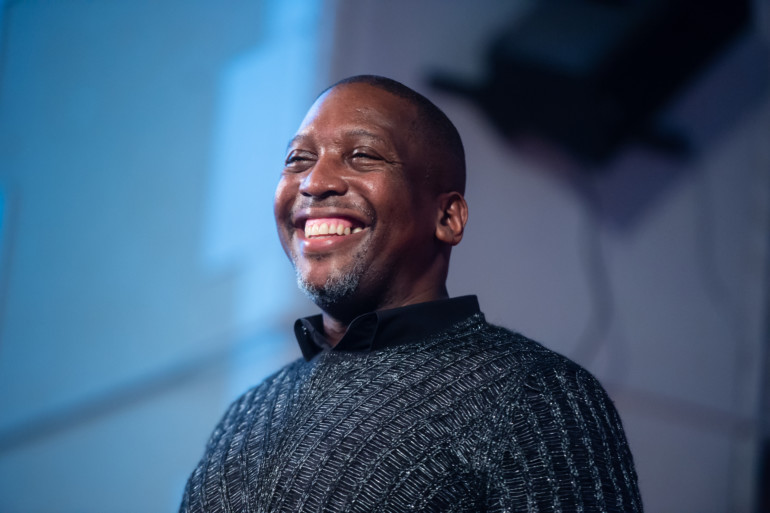
As the Minister of Celebration at Glide Memorial Church in San Francisco, a church that draws congregants from as nearby as the streets of the Tenderloin and as far away as other states — it is known as a sanctuary offering the transformative power of in-person song and celebration — Minister Marvin White has had a unique challenge in asking his congregation to stay home. He says the challenge has grown with each passing month. White likens the task of closing the physical church and going online for sermons to getting everyone in his congregation onto a spaceship.
“In the beginning of the pandemic it was easy because it was scarier and it was like I had to get everyone on the spaceship very quickly. It was like earth was getting ready to blow up and we needed to get out of here,” says White. “It was problematic because we had to leave some of our community. The elderly who said, ‘I’m too old to have a smartphone or a computer’ or, in the Tenderloin, a lot of folks who are homeless who are a large part of our congregation and they can’t get online, so they couldn’t get on the spaceship.”
White says he feels called into this moment as a minister. As “Corona fatigue” sets in, White asks his community to embrace the moment and to grow in their faith. “I keep saying, this is not a version of church we are doing, or something to hold us over until we can come back to the physical space,” says White. “This is where it is. We need to be in this moment. And we must have a faith that allows us to adapt. It is a Theology of Covid. With physical distance, you lose one sense, but other senses heighten.”
At home spirituality is more intimate, says White, and he reminds his congregation of this in his sermons. “I tell my congregation to invite God in and say ‘Come into my house. This is where I pray and prepare for you.’” With active shooters and active shooter drills becoming increasingly necessary in churches before the pandemic, White says he believes it was written that people needed to come out of the buildings and stay at home to worship for a while.
Glide has offered two Facebook Live sermons on Sunday, at 9 a.m. and 11 a.m., which White says are very well attended. The comment section, he adds, is especially lively during his sermons. “Imagine if they were doing that much talking in church!” he laughs.
“You cannot lower your mountain, but you can elevate yourself.”
Fred Fox, “The Spinning Rabbi”
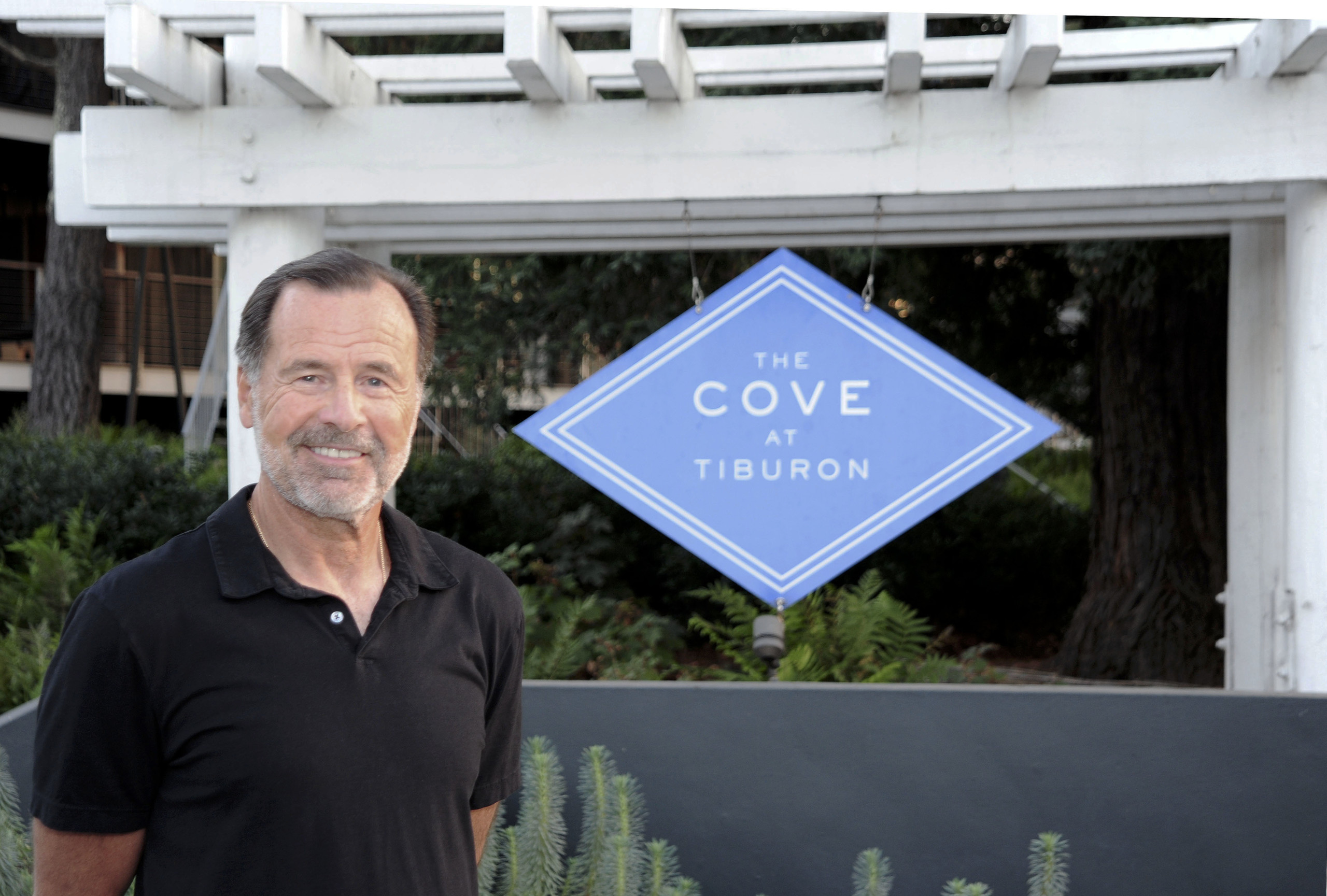
As Fred Fox of Tiburon will be the first to tell you, “I am not a rabbi, I just sound like one.” In 1995, with a long-term successful career as a financial advisor under his belt, Fox co-founded a gym and became a spinning instructor as a hobby. He discovered that while he motivated spinners on their cycles, he could use his platform to share his spiritual philosophies and inspire people in their daily lives. He further articulates his wisdom on a blog called The Spinning Rabbi and has gradually built a following of people who come to his classes and/or blog to gain wisdom and insight they might take with them as they face challenges beyond the gym.
Fox’s parents, along with several in his family’s community, survived the Holocaust. The words and example of his parents, who went on to lead fulfilling lives after gaining freedom, along with the teachings of the ancient Kabbalah and Hasidic traditions of Judaism, were the building blocks of Fox’s philosophy. He has also studied the work of Auschwitz survivors Viktor Frankl (Man’s Search For Meaning) and Edith Eger (The Choice), repeatedly turning back to both authors for spiritual and practical guidance in times of struggle. The underlying message in his over-500 blog posts, says Fox, is that, “You cannot lower your mountain, but you can elevate yourself.”
Although the Covid-19 pandemic cannot be compared to the Holocaust, Fox believes we can take lessons about our response to suffering from the survivors of Hitler’s regime. When Fox’s parents passed away and he was sorting through their belongings, he found photographs from after they had been released from the camps. The photos depicted smiling individuals, his parents amongst them. “These people were smiling and it is impossible to believe that they had endured the unimaginable, the unendurable. They were moving forward and focused on building a life,” says Fox.
The key question, says Fox, is “Do you have a strength of conviction that life has meaning?” It is the belief that our lives have meaning that we can build upon in times of struggle. Fox returns regularly to a favorite Frankl quote: “The way in which a man accepts his fate and all the suffering it entails, the way in which he takes up his cross, gives him ample opportunity — even under the most difficult circumstances — to add a deeper meaning to his life.”
Fox’s message to his readers over the past half-year of the pandemic? We can see this moment as an opportunity for growth, a chance to enhance meaning in our lives. “With the proper attitude we can create who we truly are and meant to be when we come out of this,” says Fox. “This is a chance to look at our priorities in life and ask ourselves if they really should have been priorities. We may be learning new priorities now. We may be learning lessons — this is where my focus and love and other priorities should be.”
In moments of uncertainty that bring a sense of helplessness, Fox points his followers to another Frankl quote: “Everything can be taken from a man but one thing: the last of the human freedoms — to choose one’s attitude in any given set of circumstances, to choose one’s own way.”
“Our practice is to find ways of transmuting the grief into love.”
Matthew Brensilver, Spirit Rock Meditation Center
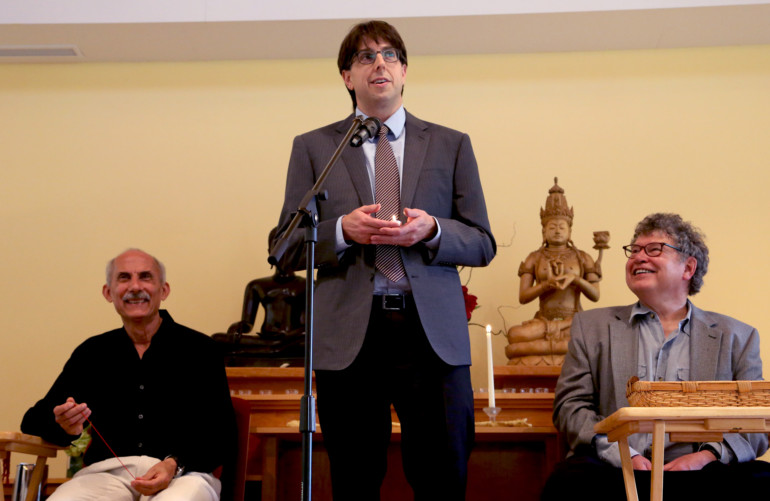
For many the retreats at Spirit Rock Meditation Center in West Marin are the bedrock of a Buddhist practice. Meditation teacher Matthew Brensilver serves on the Spirit Rock Teachers Council and regularly leads retreats at Spirit Rock, all of which have moved online during the pandemic. Although Brensilver was skeptical about the extent to which online retreats could offer solace and guidance, he has been surprised by the success of these virtual gatherings.
“We are overwhelmed and Zoomed out and, yet, simultaneously longing for a sense of connection and community,” Brensilver says. “People are leaning on each other to help stabilize their own hearts in this time when there is so much to worry about. It feels like we’re supposed to be worrying all the time. We have this redemptive hope in worrying. To put that down, to rest in the experience of being human, can feel like a betrayal of our worry itself.”
Brensilver does not suggest that we should not worry at all, or that current struggles and the associated worries are not real. Instead, he believes the practices of meditation and mindfulness allow us to put worry down for a moment: “There’s a way that coming together with others who are committed to exploring a sensory experience in the moment as it unfolds, helps us to rest,” he says. That rest does not resolve all the complexities and problems of being human, adds Brensilver, but he believes that life can look different when we rest. Developing the ability to be fully present in the moment, suggests Brensilver, allows us to both embrace the depths of our troubled reality and also to put the weight of it down at times to restore ourselves.
“As a Buddhist practitioner, one of the commitments is not to squander suffering. The precariousness of life can make us love or hate. It can draw us into a deeper sense of tenderness and honoring of life, or it can lead us to scramble and cling more tightly,” says Brensilver. In the months since the pandemic began, he has seen a heightened sensitivity to goodness. “In witnessing common decency and kindness and the solidarity of goodhearted people everywhere — the heroism of people on the frontline who are caring for folks with Covid — recognizing that they are the moral heroes of our time. Our hearts are sensitized to them. There is goodness in the world and that can be a North Star even amidst the great swathes of suffering.”
Through virtual courses Brensilver and other Buddhist spiritual guides help individuals incline their minds toward care and compassion, using grief as raw material. “There is a lot to grieve, and the depth of grief can be overwhelming,” he says. “Our practice is to find ways of transmuting the grief into love.”
“Art is healing.”
Orin Carpenter, Artist and Educator, Marin Catholic and Boston College
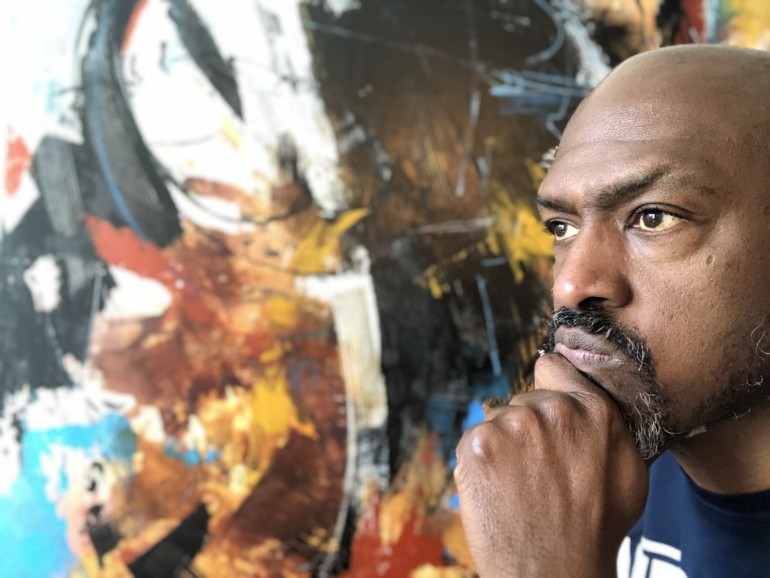
Orin Carpenter is an artist and the Visual and Performing Arts Director at Marin Catholic High School. He also teaches an online course at Boston College entitled “Educating for Racial Justice Through Art.” Over the years as an art instructor, Carpenter has become a mentor for the young people he teaches, infusing his instruction with spiritual guidance and practical life lessons. At the heart of his work are questions about identity and purpose. These questions, he says, have only become more relevant with the pandemic and issues around social injustice.
“There’s a global aspect and a national aspect that we are looking at. This is not how things were supposed to look, and that makes us question our identity and our purpose. People are questioning the meaning of their life,” says Carpenter. “High school has always been a time of identity theft, a time when we are trying to figure out who we are. In high school art classes we create a space to help students find their true purpose, their true identity without feeling like an outcast. There are two things I’d like to know my students take away from my class; they are Identity and confidence, two things that go hand in hand, like grace and mercy.”
Carpenter believes the creative process is a powerful tool and a healing balm, and that is why art is having a resurgence in the time of Covid-19. “Since the start of this pandemic, everyone is seeking online classes and private lessons,” says Carpenter. “Art is a wanted and desired outlet that everyone needs, that should have been a part of our lives always, but because of the system we grew up in, it was always considered a luxury, not something that is necessarily needed. But now people are seeing that it is needed.”
Carpenter’s personal artistic practice has deepened over the recent months. “This is one of the most fruitful periods of my life as an artist,” he says. “Prayer has always been a component of my faith. This time is making me more reflective, and my relationship with God is more in tune because it is forcing me to look at things differently. Art is always that space to dig deeper.” Carpenter hopes that people will use art as a way to cope with hardship, and also to better understand themselves and their vision. “This is the time to open a journal and do doodles, sketch, write poetry, write a song, get on the keyboard and make music,” he encourages. “Whatever it is, it will help you to tap into that spiritual connection.”
Carpenter also points out that the pandemic has offered us an opportunity to see society around us more clearly. “With social issues, we are having to pay attention.” If not for the pandemic, he believes, society might not have responded to the murder of George Floyd in the same way. “This unfortunate incident woke us up and brought us together, and now we are questioning, and that is a good thing. We are alert, our heads are up not just looking down at our phones. We are looking around the world seeing both the beauty and the ugliness that is out there.”
“We see everything with 20-20 vision”
Rabi’a Keeble, Founder and Imam of Qalbu Maryam Women’s Mosque
Rabi’a Keeble is the founder of a progressive mosque known as Qalbu Maryam Women’s Mosque in Berkeley, California. She is both a spiritual leader and an activist who works on issues of homelessness, affordable housing, female genital mutilation, and protection of refugees. Since the mosque closed due to the pandemic, she has fielded a consistent stream of emails from her Muslim community, wondering when they will be able to meet and pray together again.
“People ask me, when are we meeting? And I say to them, you are doing the most beautiful faith-driven thing you can do, and that is protecting other people. You are protecting somebody’s grandmother or grandfather,” says Keeble. “Then they ask me for guidance: where do we pray? And I tell them, you can pray anywhere. I remind people, God is everywhere.”
“Muslims pray five times daily, and these are concrete hard and fast rules of Islam,” says Keeble. “So Muslims are familiar with the home being a faith center, and women in particular have long held down their faith lives from the home.” Keeble instructs her community to refocus on the home and to center the home in faith. She also reminds followers that the Koran instructs them to practice justice. “So this moment of social justice protest is a very powerful moment for us,” she says. “And, If everybody hadn’t been at home and off of work and school because of Covid, police brutality might have been swept under the rug. People might have said ‘Oh, just another hashtag’ and gone to work.”
From Keeble’s perspective, the pandemic is teaching us important lessons. “There are times when I realize, oh that is a Covid lesson,” she says. “2020 has been a year of vision — we see everything with 20-20 vision. There’s no muddling around the edges. Clearly we have to get out and vote. Clearly we need to look at how we work with one and another in terms of race. The universe decided, this is the year I’m going to take people by the shoulder and give everyone a good shake.”
How to Help
For more ways to support local businesses, go here.
For more on Marin:
- The Newsoms, California’s First Couple: From Marin to the Global Stage
- Why We Love Comfort Food: The Science Behind Holiday – and Covid – Indulgence
- The Bravest Warriors Can Be Small
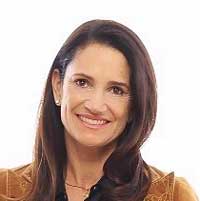 Kirsten Jones Neff is a journalist who writes about all things North Bay, with special attention to the environment and the region’s farmers, winemakers and food artisans. She also works and teaches in school gardens. Kirsten’s poetry collection, When The House Is Quiet, was nominated for the Northern California Book Award, and three of her poems received a Pushcart nomination. She lives in Novato with her husband and three children and tries to spend as much time as possible on our local mountains, beaches and waterways. For more on her work visit KirstenJonesNeff.Com.
Kirsten Jones Neff is a journalist who writes about all things North Bay, with special attention to the environment and the region’s farmers, winemakers and food artisans. She also works and teaches in school gardens. Kirsten’s poetry collection, When The House Is Quiet, was nominated for the Northern California Book Award, and three of her poems received a Pushcart nomination. She lives in Novato with her husband and three children and tries to spend as much time as possible on our local mountains, beaches and waterways. For more on her work visit KirstenJonesNeff.Com.

